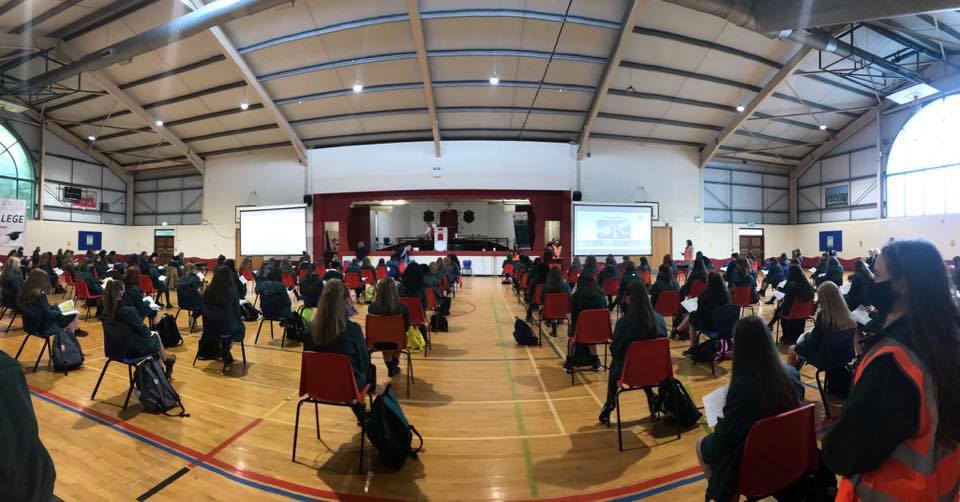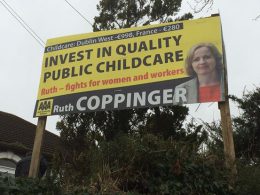by a Socialist Party reporter (Second-level teacher)
The government has utterly failed to prepare for a safe return to education. ‘Criminal’ was the word used by one teacher who confronted the Taoiseach after a photo-opportunity at a Cork school on August 20th. Years of underinvestment and the highest class sizes in Europe makes school reopening in Ireland particularly risky.
While many teachers, students and parents are craving a return to normal after months of lockdown, for most this longing is mixed with fear. This is especially true of working-class and disadvantaged students who lost out the most during lockdown. Schools must reopen – delayed if necessary – but a safe return to work is entirely possible. We spoke to workers across different parts of the education sector – primary, secondary and further education – to see what their issues and demands are and to get a picture of what a safe return to education could look like.
There is nothing in the government’s plan, published July 27th, on reduced class sizes. The funding does not come close to matching the challenge. When new lockdown measures were announced on August 17th, there was no mention of education. It’s as if the schools are located in a parallel universe. In an appearance on RTÉ’s Prime Time on August 25th, Education Minister Norma Foley was simply not asked about class sizes or resources. When asked tough questions, she passed the buck: to the Department of Health on paid leave for sick teachers, and to individual schools on whether they’re allowed to hold gatherings of hundreds of students.
A safe return is possible, provided education workers are in the driving seat and the Department is pressured to invest in our safety and to take serious action. It cannot be done on the cheap. But the government handed €300 million to private hospitals for beds that were never used; a massive investment in school facilities, staff and students, and crucially the restoration of pay equality, are not too much to ask.
Primary schools: ‘Just do what you can’
We spoke to James, a primary school teacher:
What do you think are the main problems with the government’s road map?
It’s inconsistent and won’t effectively suppress the virus. The road map for society is incompatible with schools… Why are schools different?
What has the response been like to the government’s road map among your co-workers?
Every teacher I have spoken to is worried, worried for the first time in their teaching careers that schools aren’t safe to reopen. Most see that the guidelines can’t all be implemented, as it’s impossible, and therefore teachers are rightfully worried for their safety. I know other teachers who live with their parents and are terrified of bringing it home.
What has the response been like from your union?
There hasn’t been a response; they haven’t challenged the government’s plans on the basis of their impracticality. I would be quite concerned that they are not prepared to fight for their members, and accept that class sizes, extra funding, supports for high-risk teachers isn’t affordable, so have gone along with the government’s disastrous approach.
In St Patrick’s, a primary school in Limerick, social distancing of one metre, never mind two, is not practical due to limited space. Management have looked into renting space nearby but would face rents of €50,000-€60,000 annually! As well as being at the mercy of the virus, schools are being left at the mercy of landlords. According to the principal they were told by the Department to ‘just do what you can’ – another way of saying, ‘you’re on your own.’ (https://www.rte.ie/news/2020/0824/1161008-limerick-school-social-distancing/)
The government’s approach is to put the burden on individual schools rather than providing resources. But ‘declutter and make do’ is leading to grotesque outcomes – such as at Clonbonny National School in Athlone, which is being forced to use a cramped, unventilated garden shed to serve as an ‘isolation room’ for children with symptoms.
Secondary schools: ‘Walk back into a burning building’
Sandra, a secondary school teacher, gives another example of the buck-passing that’s going on: key decisions on healthcare are being made by Medmark, a private occupational healthcare outfit. ‘Medmark are putting teachers in life-and-death situations. Yesterday in the newspaper it was reported that a teacher, “Tom”, with both cancer and a heart condition, is being ordered back to work against the advice of his consultant. Medmark have said he is not very high risk, he is only high risk. But the World Health Organisation only has one category: High.’ Pregnant teachers are likewise being told they are not high-risk – again, Medmark is overriding the decisions of doctors.
Regarding Covid-19 unemployment payment and sick leave for teachers who show symptoms or who have been exposed, Sandra points out that there’s ‘no clarity around it whatsoever.’ On SEN students: ‘there are no measures or roadmap in place. I’m worried all extra resources needed will be taken from SEN students.’ Meanwhile, ‘Guidance for practical subjects were only issued yesterday and are very minimal. The 1080 jobs [promised under the road map] are not really jobs.’ As for what to do about students or parents who refuse to comply with requirements – again, that’s up to the school.
Sandra highlights the 2005 Safety and Welfare at Work Act: ‘Why did our union not use this to demand that we not walk back into a burning building? You can’t have two separate guidelines for school and the rest of society. Two metres’ social distancing is the most effective means of stopping the spread of the virus. The school community deserve this basic safety measure. Classroom sizes and ventilation need to be addressed immediately.’
Ruth, a secondary school teacher, gives an idea of the efforts being made by individual schools:
‘I’ve been told there will be 22 per class generally. I haven’t seen the rooms but I guess this is one metre at best. Overflow students will go to a classroom in the same area and be supervised with work. Those students will rotate.
‘The students remain in base class and move for options. Year groups will be in same area so there’s little movement.
‘There is no morning break. Classes are hour-long. Students will be asked to wear masks. It’s possible to allow a break in the class and step outside to get a break from the mask. Visors have been ordered. Perspex screens were built by the woodwork teachers…
‘There seems to be more sub teachers available this year compared to last because of lack of travel. This is based on the principal advertising and getting more replies.’
Such positive efforts are limited due to the confines of the government’s plans. Also, different schools will have different levels of safety – whether due to mistakes or neglect by management, or because of overcrowding and lack of resources.
On top of all this, although schools are effectively on their own, they are still legally liable.
Further Education: ‘Workers have to walk out’
We spoke to Diarmuid Naessens, Youthreach teacher; Teachers’ Union of Ireland (TUI) Chair, Dublin City branch (personal capacity):
What do you think are the main problems with the government’s road map?
As a TUI chair in Dublin City, we know some principals or managers will work inclusively with TUI members. We also will encounter the autocratic, cabal-like structures who always leave our members on alert. The Covid pandemic has only exacerbated that tension. The government roadmap will be no more than an imposition, where those trade unionists who ask questions will be made out to be the problem.
What has the response been like from your union?
The left branches wish to strengthen the hand of collective action where workers have to walk out in a way that meets our duty of care to our students.
‘As in when there is a fire drill evacuation of buildings, likewise in a Covid-19 outbreak, no principal has the right to gamble with our Health & Safety. We take ownership as workers and act in the collective interest. We will be mindful under these circumstances if they arise not to be left open to spurious accusations by management of “abandonment of our posts.”
What are the main measures you would demand as necessary before a return to work?
Diarmuid argues that a pupil-teacher ratio of 15:1 is required, ‘given the amount of people with degrees on the live register and the need to catch up with the rest of Europe after years of poor investment by successive governments in Education.’
Diarmuid described a meeting of 100 representatives of 1,000 members in the Dublin area on August 25th: ‘Some of the left union reps made really relevant and sharp contributions such as: “The buildings we are in, in Further Education, have often not been upgraded in 20 years at least; social distancing is going to be a real problem.” “You open a window that’s high up and call that ventilation?” “In the winter we are always watching to see the temperatures don’t go below the agreed natural temperature of 17 degrees – the buildings are that decrepit!”
‘The discussion was lively. Many members are anxious and apprehensive about Covid and believe some colleges at further ed will become clusters for Covid. There are concerns that basic hygiene on hand washing etc will disimprove as time goes on and that this is really about the Government opening the economy.’
Unfortunately, a motion empowering workers to walk out if health and safety are in danger was amended and rendered toothless – essentially, a more cautious section of the union leadership argued that the shut-down of schools should occur only through official channels.
Diarmuid says: ‘How Covid 19 unfolds over the next six months will bring back up the need for workers to take direct action to safeguard themselves and their students; we can’t have any dependency on the employers or our union officials.’
‘Make education truly free and accessible to all’
The Covid-19 crisis has shone a harsh light on so many social and workplace problems under capitalism in this country, from the health service to the meat industry. What problems or potential solutions do you think this crisis has brought to light in the education sector?
Diarmuid: We work with the most vulnerable, economically- and socially-disadvantaged students in Dublin City in second level, further education, Youthreach and adult education etc. The Covid crisis has only sharpened the gap with more stable socio-economic groups because of lack of access to space our students encounter and a lack of resources like laptops and printers.
James: Schools are understaffed and underfunded. The crisis has exposed the real difficulty teachers face in normal times, let alone in a pandemic. To make schools safe would require investment in more rooms, buildings and hiring of more teachers, SNAs and other school staff that are essential in the running of schools. Moreover, the switch to online teaching has exposed the inequality across the education system, where children from less-advantaged areas who didn’t have access to laptops or good internet connection speeds. We need to use this dreadful pandemic as an opportunity to make schools a better learning environment and make education truly free and accessible to all.
For a safe return to work
Some common demands across the sector emerge from the above points.
Emergency investment to provide more space and staff to allow for reduced class sizes.
· Sick pay and full pay for staff who are in a high-risk category or who catch the virus – this would mean the hiring of more teachers and SNAs and the restoration of pay equality.
· Treat education like the rest of society – apply the health guidelines inside as well as outside our schools.
· Reduce the pupil-teacher ratio to 15:1. Groups of 20-30+ are not safe. If 15 is the largest group that can assemble outdoors, why should a greater number assemble in classrooms?
· Unions must empower members to lead walkouts if Health and Safety concerns raised by workers are not addressed.
· We need electronic devices, PPE and real investment in our school infrastructure. We must not accept the false narrative of scarce resources.
· Make empty buildings and other premises available to schools, rent-free. Do not leave schools at the mercy of the private capitalist rental market.
· Use blended learning to reduce numbers, combined with a reduction in work hours without loss of pay in recognition of the extra workload of online teaching.
· We need serious criteria on who is deemed too vulnerable to work – not the arbitrary judgements coming from Medmark.
· Expand the Home Tuition scheme to allow one-to-one and small-group teaching for vulnerable staff and students.
· Bring in effective tracing and testing, and full sick pay and protections for workers in all industries, to eliminate the virus and to make all workplaces and communities safe.
In addition we support the following demands, accepted by the Association of Secondary Teachers in Ireland (ASTI) on 21st August (Edited for brevity; for exact wording see https://www.asti.ie/news/standing-committee-discusses-re-opening-of-schools/):
· Teachers must refuse to participate in year-group or school assemblies.
· Alternative arrangements such as working from home must be made for teachers who are in the ‘high risk’ category.
· Review physical distancing requirements for schools, postponing the return to school if necessary.
· Any return to school should be evenly staggered over the course of the entire month of September.
· Bulk-purchase laptops for students and teachers.
· Commission new school buildings and in the meantime order prefabs.
· End unequal pay and the offer a permanent contract to any teacher who returns to the system.











